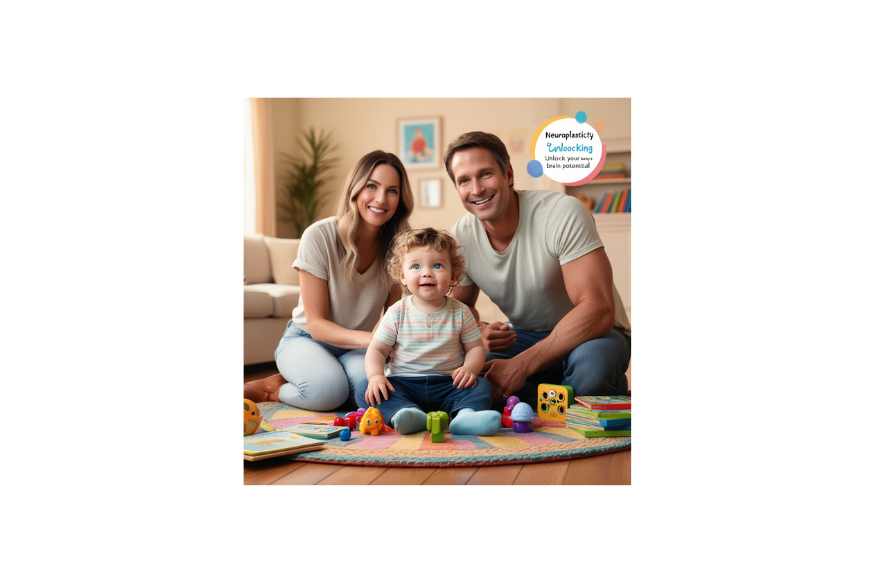Neuroplasticity – Unlocking Brain’s Potential
Neuroplasticity: Unlocking Your Brain’s Incredible Potential Are you inadvertently hindering your child’s cognitive growth? Don’t overlook this. Take the time to read about Neuroplasticity if you genuinely care. As a parent, we often focus on teaching new words in the preconceptual stage, where children tend to use a single word, for multiple objects and engage in an imaginative play whilst struggling to articulate their ideas due to language skill limitations. This prompts parents to take an approach towards teaching new words. However, have you also thought of focusing on teaching them how to coordinate and balance? While they develop language skills and explore their surroundings, promoting physical growth is just as vital as cognitive development In an age filled with screens and sedentary pastimes ensuring that our children receive physical and mental stimulation can be quite challenging. Conventional methods of education and play often lack cultivating abilities like coordination, balance and problem solving. This has raised worries amongst many parents about their kid’s future achievements and well-being. Neuroplasticity stands out as one of the critical aspects of childhood development How does Neuroplasticity work and how can you unlock a child’s potential through Neuroplasticity? Neuroplasticity, often referred to as brain plasticity, is a groundbreaking concept that highlights the brain’s incredible ability to reorganize itself by forming new neural connections throughout life. It refers to the brain’s capacity to alter and adjust in response to experiences. For instance, envision a child mastering the art of riding a bicycle. Through practice the brain adjusts by establishing connections between neurons to support tasks such, as balancing, pedaling and steering simultaneously. These connections strengthen with each attempt gradually improve the child’s biking skills. This process of acquiring and refining skills is directly linked to neuroplasticity. Children’s brains act like sponges to soak up and adjust to knowledge and experiences. Their brains grow and evolve significantly based on their surroundings and the activities they engage in. Encouraging children to engage in enriching activities that challenge both their minds and bodies can boost their abilities, refine their problem-solving acumen and nurture their creativity. Parents must not emphasize on teaching language and numbers alone but also foster balance, coordination and overall brain wellbeing of a child. One effective method to enhance neuroplasticity is the TIPAYI balance bikes. Why TIPAYI Balance Bikes? TIPAYI, which gained recognition on Shark Tank India is well known for its approach to kids bicycles. These are not just bikes; they’re uniquely crafted wooden balance bikes that evolve alongside your child. The patented design of TIPAYI bikes aids children in honing their balance and coordination skills from an age crucial for fostering neuroplasticity. Their bikes are designed without pedals, brakes and training wheels on purpose. This unique approach helps children grasp the skill of balance quickly. With its design and precise engineering TIPAYI enables kids to have a fun biking adventure, without the worry of toppling over. It empowers children to take charge of their biking journey. TIPAYI bikes have three stages of growth to inspire kids to be active and boost their brain development. Tribike (12 months – 2.5 years): This ideal Tribike is for the initial phase of toddlers that require additional support to boost their confidence and stability. Low Rider Balance Bike (2.5 – 3.5 years): Progressing through this stage offers the true balance bike experience – its proximity to the ground guarantees that young legs can confidently practice balancing. High Rider Balance Bike (3.5 – 5 years): This stage with its additional height of the bike helps kids perfect their balancing technique & prepare them for a pedal bike. How TIPAYI Supports Cognitive Development? Here are some ways these balance bikes can benefit your child’s thinking skills. Improves Balance and Coordination: Balancing on a bike challenges the brain enhancing connections, between neurons. Builds Confidence: Mastering each stage of biking boosts self-confidence motivating kids to take on challenges. Enhances Problem Solving Skills: Riding on surfaces without pedals promotes critical thinking and adaptability. Promotes Outdoor Play: Engaging in activities outdoors is crucial for development and overall wellbeing. Choosing a TIPAYI balance bike goes beyond getting a toy—it’s an investment in your child’s future. By nurturing their growth and stimulating neuroplasticity you’re equipping them with the tools they need to thrive. Don’t hesitate to give your child a start in life. Explore the range of TIPAYI balance bikes. Witness how they can positively impact your child’s development during their early childhood education. Check out this link to explore more and buy something today: https://www.vamshycle.com/ Author – Jigna Shah
Neuroplasticity – Unlocking Brain’s Potential Read More »

